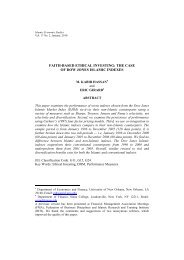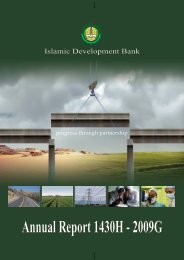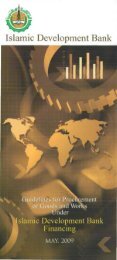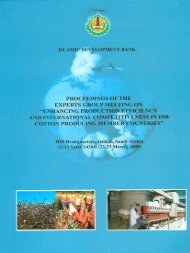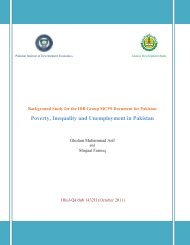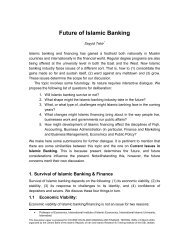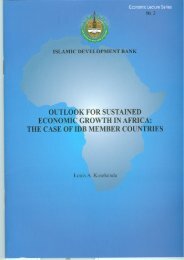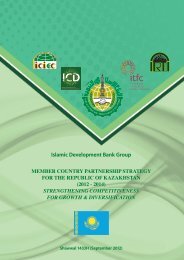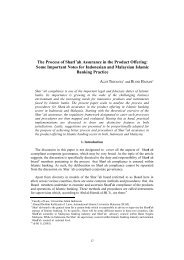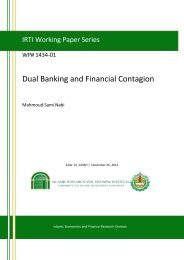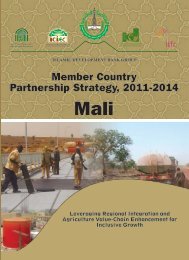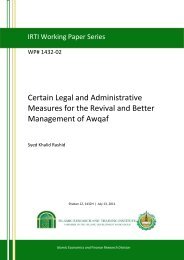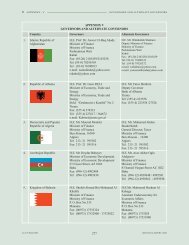Country Economic Work for Malaysia - Islamic Development Bank
Country Economic Work for Malaysia - Islamic Development Bank
Country Economic Work for Malaysia - Islamic Development Bank
You also want an ePaper? Increase the reach of your titles
YUMPU automatically turns print PDFs into web optimized ePapers that Google loves.
construction engineering sectors are expected to see a major increment in terms of Sukuk to<br />
be raised as <strong>Malaysia</strong> will be moving ahead with major public infrastructure projects i.e. the<br />
Klang Valley Mass Rapid Transit, Greater Kuala Lumpur / Klang Valley development and<br />
many other economic corridors projects.<br />
Challenges/ Constraints <strong>for</strong> Private Sector Resource Mobilization<br />
112. Following are the binding constraint <strong>for</strong> private sector resource mobilization in<br />
<strong>Malaysia</strong>:<br />
While <strong>Islamic</strong> banks worldwide have proven their resilience during the global crisis, the<br />
supply shortage of <strong>Islamic</strong> instruments has impacted the effective management of<br />
liquidity within <strong>Islamic</strong> banks. Recognising this, <strong>Malaysia</strong> has collaborated with other<br />
countries to establish the International <strong>Islamic</strong> Liquidity Management Corporation (IILM) in<br />
2010 to support cross-border liquidity management with the intent of both deepening and<br />
broadening the global <strong>Islamic</strong> finance industry. The establishment of IILM was initiated by a<br />
recommendation from the High Level Task Force on Liquidity Management, which was<br />
established by the <strong>Islamic</strong> Financial Services Board Council.<br />
Due in large part to the recent financial crisis, there has been default cases involving<br />
Sukuk in the <strong>Islamic</strong> financial industry worldwide. A significant component of an<br />
established global <strong>Islamic</strong> financial system has the dispute resolution framework, which is<br />
crucial to providing the necessary assurances and strengthening confidence in the system,<br />
especially in the event of a crisis or transaction default. As part of the ef<strong>for</strong>t to strengthen the<br />
dispute resolution process <strong>for</strong> the <strong>Islamic</strong> finance industry, <strong>Malaysia</strong> has already established a<br />
dedicated High Court in Kuala Lumpur to adjudicate Muamalat cases. As an alternative<br />
dispute resolution channel to the court system, the Kuala Lumpur Regional Centre <strong>for</strong><br />
Arbitration has been enhanced to serve as a plat<strong>for</strong>m to deal with cases involving <strong>Islamic</strong><br />
finance, particularly within the Asia Pacific region. By having adopted United Nations<br />
Commission on International Trade Law Arbitration Rules, it offers speedier settlements<br />
relative to the court’s process and freedom to choose governing laws.<br />
New strategy is needed to facilitate internationalisation through the widening of the<br />
<strong>Islamic</strong> Capital Market’s international base. This includes the need to further strengthen<br />
the capacity to structure multi-currency and cross border transactions and build greater scale<br />
to enable <strong>Malaysia</strong>n intermediaries to make greater inroads into the international market. The<br />
transition into the mainstream of the global financial system will provide opportunities <strong>for</strong><br />
<strong>Malaysia</strong>n market intermediaries to seek new frontiers and expand new markets, as well as<br />
contribute towards further widening the diversity of products and services.<br />
In order to meet the new challenges, innovation in <strong>Islamic</strong> financial system is<br />
paramount. In this context, the <strong>Islamic</strong> financial system has to continually innovate and<br />
adapt in order to be competitive. At the same time, innovation is also the driving <strong>for</strong>ce behind<br />
developing greater diversity of products and services. There<strong>for</strong>e, there is a need to focus on<br />
product innovation and development ef<strong>for</strong>ts that will provide a comprehensive array of<br />
Shariah-based products <strong>for</strong> the industry. While in <strong>Islamic</strong> finance, innovation has been<br />
significantly pervasive, there is a need to further accelerate its momentum to ensure that they<br />
achieve the objectives that they aspire. However, the challenge to innovate and adapt must<br />
be based on the core principles and values as well as ethics of Islam.<br />
51




